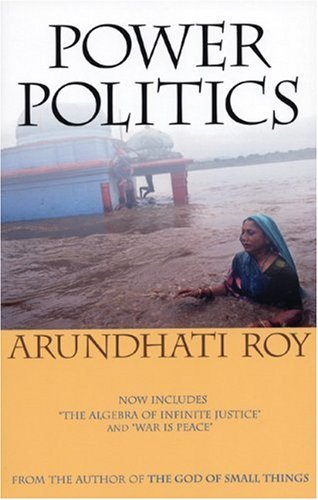Power Politics

Rating: 4.6/5
Author: Arundhati Roy
Hardcover: 182 pages
Publisher: South End Press
Publication Date: 1st April, 2002
Language: English
Genre: Political theory, Non-fiction
ISBN-10: 0896086682
ISBN-13: 978-0896086685
Plot:
In Power Politics, Arundhati Roy challenges the idea that only ‘experts’ can speak out on such urgent matters as the globalization of the world economy, the privatization of India's power supply by US-based energy companies, and the construction of monumental dams that will dislocate hundreds of thousands of people. Roy takes us to the frontlines of struggles for social justice and a humane, democratic future.
Review:
The book contains three essays in which the author shares her ideas about India's nuclear tests; the development debate, especially in regard to dams; and the privatization of the country's power supply by U.S.-based energy companies.
She exposes the power play of the big powerhouse companies. She believes that the dominating reason behind all of this suffering and inequity is ‘globalization’ whose advocates try to showcase it as a movement to eradicate world poverty. She sees it as ‘a mutant variety of colonialism, remote controlled and digitally operated’.
She further continues, "It makes for bad TV. It has to do with boring things like jobs, money, water supply, electricity and irrigation. But it also has to do with a process of barbaric dispossession on a scale that has few parallels in history."
Roy speaks out passionately against the hypocrisy of the International Coalition Against Terrorism, which she takes as a group or camp of the richest countries in the world: "Between them, they manufacture and sell almost all of the world's weapons. They possess the largest stockpile of weapons of mass destruction-chemical, biological, and nuclear.
Arundhati makes it clear about the ongoing pawn game that takes a heavy toll on the citizens specially on the poor people. Like she says,
"To be a writer in a country that gave the world Mahatma Gandhi, that invented the concept of nonviolent resistance, and then, half a century later, followed that up with nuclear tests is a ferocious burden….To be a writer in a country where something akin to an undeclared civil war is being waged on its subjects in the name of 'development' is an onerous responsibility. When it comes to writers and writing, I use words like 'onerous' and 'responsibility' with a heavy heart and not a small degree of sadness."
About the Author:
Arundhati Roy is an Indian writer who is also an activist who focuses on issues related to social justice and economic inequality. She won the Booker Prize in 1997 for her novel, The God of Small Things, and has also written two screenplays and several collections of essays.
For her work as an activist she received the Cultural Freedom Prize awarded by the Lannan Foundation in 2002.















































